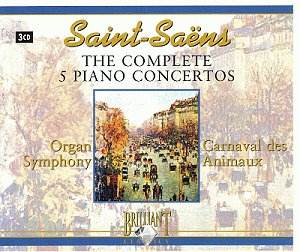Saint-Saëns has been described as the ‘French
Mendelssohn’, and in some ways this is quite appropriate; both were
phenomenal child prodigies, both composed music in an infectiously tuneful
manner and both have often been dismissed in musical history as ‘lightweight’
and therefore of no real significance. Indeed, Saint-Saëns’ famous
remark that he ‘composed as naturally as an apple tree produces apples’
highlights the problem for some; that his sheer technical facility extinguished
any spark of originality. Thankfully that opinion has changed, due in
no small part to the gramophone, and we are able to judge his work properly
and in context, particularly the important cycle of concertos for his
own instrument, the piano.
The resurgence of interest in these works as a whole
has gathered pace recently, with Stephen Hough’s Hyperion set surely
taking pride of place. There has also been another budget set from Angela
Brownridge on ASV, and one should not overlook older but superbly recorded
cycles from Rogé and Dutoit (Decca), Collard and Previn (EMI),
Ciccolini and Baudo (also EMI), and the important historical set from
Jeanne-Marie Darré (French EMI). In the face of such stiff competition
(most of which are cheap ‘two-for-ones’) the present set is going to
have a tough time finding its foothold in the market. For a start, Brilliant
Classics have shot themselves in the foot somewhat, by making this a
3 disc set; most collectors will surely only want the concertos, and
if they do want the oft-recorded couplings they are both available in
much better performances elsewhere. So not only is any price advantage
wiped out but the record buyer is possibly forced into unnecessary duplication.
As for the main items, these are a very patchy affair.
They have the distinction of featuring the veteran French pianist and
personal friend of Poulenc, Gabriel Tacchino. His glittering virtuosity
is very much the best thing here, with the murderously cruel scalic
runs and thundering octave work that abound in these pieces despatched
with ease. If only the orchestral contribution was as distinguished;
listen to the poor intonation in the lower strings in the evocative
opening of Concerto No. 1’s slow movement, and also the less-than-well
synchronised pizzicatos slightly later in the same movement. It all
sounds very under-rehearsed and even Tacchino’s sure touch and feeling
for the poetry in these pieces is severely undermined by the shallow
recording quality. The only hint at the origins of these performances
is a small note on the back of the case saying ‘Licensed from Vox’,
so we have to assume they were made in the 60s; even so, the sound is
unacceptably harsh and empty, with the upper register of the piano sounding
brittle and tinny. Tacchino’s playing deserved better, and it is a measure
of his performances (and of course the quality of the music itself)
that occasionally the shortcomings are forgotten and one can revel in
the zest and joyousness of it all. But turn to any of the other sets
and one is in a different league; all the pianists have the requisite
technique and artistic insight (listen to Hough in the opening of Concerto
No.2– breathtaking!), and all are given more full-bodied and refined
orchestral support and recording to match.
The third disc somewhat seals the fate of this set
for me, with a pedestrian rendition of the famous "Organ"
Symphony (no match for Dutoit, Tortelier or Munch) given only a
marginally better recording. The "Carnival" is a non-starter,
with the two (uncredited) pianists appearing to come from different
venues, one ‘in-your-face’, and the other about three rooms away!
In the light of such competition all round, this release
smacks a little of jumping on the Saint-Saëns concerto ’bandwagon’;
there is no documentation whatsoever, no details of recording venues
or dates, and all round one can only conclude that even the most impecunious
collector can do better elsewhere.
Tony Haywood


